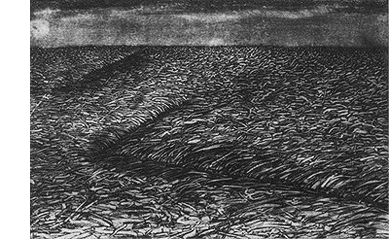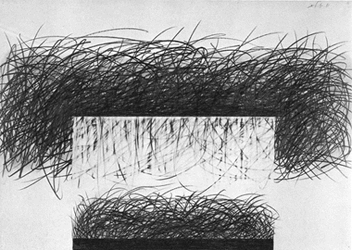
Joshua Cohen
3.
A field, not salted, so nothing could, would, grow again—a field of salt: stalks of salt and dunes, less a field really by now than a desert of salt, a salt desert revealed by the obliging, escaping sea. A playplace for the regional children.
Who are as ignorant as can be regarding the past, or at least regarding long prior incarnations of this desolate if not unparented plot, withering from without for generations it is unable to preserve.
On most days, the children run free, as though they possessed the hard salt flora, shoes scratching rhythms less diurnal than not (and too manic and even incalculable for nature or its opposite), on the granular, knee and knob reddening floor. Playing games of unobserved intricacy and much deceit, which they must have learned from their elders: hiding games, of enumeration, of educable guessing, of occasional though to be sure it’s intended as nonfatal impalation… also of seeking, of finding, also of implacable violence that must have been self-taught—how else to understand it?—as necessary to their exacting, most real futures, as the ones who sing them in, in soured tones, in words of impatient empty scorn. To then run slow to the mound to the east, or is it the west? the desert rising white, high, to launch them into running, or so it seems, on the sky, to run home where they’re, yet again, warned from this place, where it must be related that an apparently random two, at the least, of their peers end up losing their parents to a lesson each season which winds nature to sorrow, binds it to grief.
But one day a moon, if it’s ever that regular, a most elderly man sits atop the highest mound of salt rising between them and home, facing the slope down to the playplace, unshod, kicking mouthfuls down, and telling the children assembled a history whose details, whose skeletal outline, the lineaments of which, they forget, always and irrevocably forget during the course of their subsequent gaming below. Which the elder never expressly forbids, even if he could, never even warns from, but always merely accepts with the inevitability of a man who’s known the sea, and known it well, but will never return there, or even ever seek to remember its depths.
It’s hard to nearly impossible to orient yourself in a landscape of salt. But then perhaps landscape is the inappropriate word. For a long time, those with memories of the future they had once expected could only compare the present reality to their expectations: their futures on the surfaces of far-off planets, in ever further-off galaxies, universes, which men would one day explore and, subsequently, exploit with an aim to mere survival. Advancement, progress, would never be spoken of again, and, indeed, a suitable analogy could be found in this, let’s call it a saltscape, where any foreign presence would be discerned, and could be dealt with. In a matter of the most urgent immediate… and though the elder attempted to speak to the children of these things, these losses let’s say, he found the problem more his than theirs, the children he had never had. (And, it must be said, that after more time, generations, ages, he lost his ability to draw the audiences he used to draw. A stick he’d saved up somehow, a length of driftwood, he’d forgotten, an ancient whaling vessel’s grave marker adrift on the firmest terra—used to illustrate the appropriate rules for the appropriate games…)
 Such was the divide that soon he ceased his attempts, altogether arrested them, and contented himself with merely, and neutrally now, observing new games sprung up beneath the slope of his mound, games unknown, variations on those he had, equivocally unknowingly, introduced to them, and as such played without attribution. And, further, the children stopped returning home when time was called, as it was, but less and less faithfully, according to a schedule that once divined would reveal All, and once revealed would never be called again, until they, the children, had established their permanent presence in the salt desert, a new total home they would never quit, but rather a home in which they would live and live deeply, in which they would totally live, amid the severe fingers of purest salt… in a perpetual stasis of thoroughgoing game, hiding from him, the elder, behind variegated formations and outcroppings shaped by any mischance of the imagination’s eye: albino roaches that had survived, disfigured vehicles, the aftermath of absolute but not absolving fire, and so on, all hidden and hidden behind in the hope—the elder could only think, hope, being unable to make out let alone question an individual child—in the hope, yes, hope, that the elder would seek, and then find. Of which he sought to accomplish neither. Unaccomplished. As the saltscape was desolate, populated with only the terrible echoes of the children’s most extreme, cruelest register of laughter, also the ghosts of assorted epifragmentals, offhand scatologies, hitting the slope and ascending to course quick from constellation to constellation—this laughter and occasional high eerie wolfwhistling (at which they were more accomplished than he, though he had taught), which came to his old dumb ears from mouths which now forever refused to listen.
Such was the divide that soon he ceased his attempts, altogether arrested them, and contented himself with merely, and neutrally now, observing new games sprung up beneath the slope of his mound, games unknown, variations on those he had, equivocally unknowingly, introduced to them, and as such played without attribution. And, further, the children stopped returning home when time was called, as it was, but less and less faithfully, according to a schedule that once divined would reveal All, and once revealed would never be called again, until they, the children, had established their permanent presence in the salt desert, a new total home they would never quit, but rather a home in which they would live and live deeply, in which they would totally live, amid the severe fingers of purest salt… in a perpetual stasis of thoroughgoing game, hiding from him, the elder, behind variegated formations and outcroppings shaped by any mischance of the imagination’s eye: albino roaches that had survived, disfigured vehicles, the aftermath of absolute but not absolving fire, and so on, all hidden and hidden behind in the hope—the elder could only think, hope, being unable to make out let alone question an individual child—in the hope, yes, hope, that the elder would seek, and then find. Of which he sought to accomplish neither. Unaccomplished. As the saltscape was desolate, populated with only the terrible echoes of the children’s most extreme, cruelest register of laughter, also the ghosts of assorted epifragmentals, offhand scatologies, hitting the slope and ascending to course quick from constellation to constellation—this laughter and occasional high eerie wolfwhistling (at which they were more accomplished than he, though he had taught), which came to his old dumb ears from mouths which now forever refused to listen.
History! Germe said (in the name of what he knew himself).
Reason! he shouted to noise.
Excuses! screamed before he fell to his nakedness and began, with his nails, scratching at his grave, on the summit of the mound, in the salt forever unyielding.
From a moon we may launch from our tongues
at any instant we so perceive,
his form is still appreciable,
and some believe always will be,
imperfecting, in perpetuity then,
the whiteness which lights
our need.
August, 2005
February, 2005
The last words of Israel's soldier-poet
January, 2005
February, 2005
January, 2005
December, 2004
May, 2004
December, 2003
November, 2003
July, 2003
April, 2002



The Jerusalem Same-Sex Attraction Group
Phil S. Stein
The Second Coming of Yeshayahu Leibowitz
Avi Steinberg
An Account of the Saltscape
Joshua Cohen
Fresh Baked Bread
Jay Michaelson
Out of the Depths
Lorna Knowles Blake
Lore
Adam Lavitt
Archive
Our 790 Back Pages
Zeek in Print
Fall 2005 issue out now!
About Zeek
Mailing List
Contact Us
Subscribe
Tech Support
Links
From previous issues:
French Antisemitism
Guilt Envy
Not Mentioned
Michael Shurkin
Dan Friedman and David Zellnik
Hal Sirowitz

 Email us your comments
Email us your comments